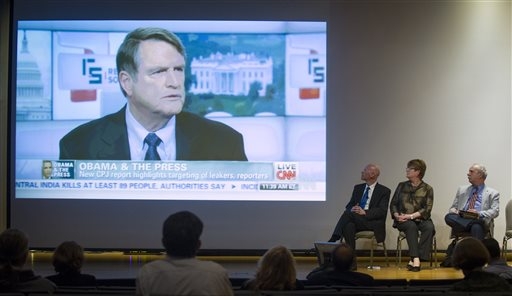
INDIANAPOLIS (AP) — Associated Press Executive Editor Kathleen Carroll said Monday she is looking forward to the start of new Obama administration protections for journalists after the Justice Department's "overly broad" collection of AP phone records.
Justice Department officials acknowledged in the spring they seized records for 21 AP phone lines during an investigation into the leak of information on a foiled al-Qaida bomb plot. The revelation spurred strong criticism from press and civil rights groups. It also resurrected long-simmering questions of what tools journalists should use to protect their sources and where the line is drawn in protecting national security interests.
"The Justice Department has agreed to amend the rules that we spoke about, because in many ways the protections that were in those rules seemed not to have occurred in our particular case," Carroll said. "We are, as an institution, glad the rules have been changed so there will be additional oversight when the media is involved. And we look forward to the implementation of those new rules, which have not yet to this point occurred."
Carroll's comments came Monday during a panel discussion entitled "Is journalism a crime?" during the 80th annual Associated Press Media Editors' conference in Indianapolis.
The Obama administration has been aggressively pursuing people it believes have revealed government secrets, including seeking records and testimony of journalists who were given classified information and then published stories about it.
The Justice Department launched its investigation of the AP shortly after the news cooperative reported that U.S. intelligence had learned that al-Qaida's Yemen branch hoped to launch a spectacular attack using a new, nearly undetectable bomb aboard a U.S.-bound airliner around the anniversary of Osama bin Laden's death. The May 7, 2012, story attributed details of the operation, including that the FBI had the bomb in its possession, to unnamed government officials.
CIA Director John Brennan has called the leak "irresponsible and damaging," while Attorney General Eric Holder said the story was the result of "a very serious leak, a very grave leak."
About a year after the story was published, the Justice Department informed the AP that it had secretly obtained nearly two months of call records for 21 telephone lines used by AP reporters and editors, including some who worked on the story.
The news cooperative protested the government's actions as chilling to investigative journalism. AP chief executive Gary Pruitt called the records' seizure a "massive and unprecedented intrusion" into how news organizations gather the news.
The very scope of the Justice Department's records seizure was surprising, Carroll said Monday. Phone lines for reporters and editors in Washington, D.C., were gathered along with AP phone lines in Hartford, Connecticut, but so were phone records of employees' spouses, Carroll said.
"You can see where we felt this was broad, overly broad: What in the world could they hope to gain from records like Hartford, Connecticut's?" Carroll said.
Panelists discussed a broad range of concerns outlining tensions between national security interests and the public's right to know what its government is doing.
Gary Ross, a veteran national security worker and author of "Who Watches the Watchmen?" said it may appear the Obama administration is cracking down more frequently on leaks, but changes in the digital age have raise the stakes in that debate.
People like WikiLeaks founder Julian Assange and former CIA contractor Edward Snowden now have access to much greater troves of information and the rise of non-traditional media outlets have broken governmental relationships that used to be maintained by more mainstream outlets, he said.
"Where do you draw that line in protecting government information and the public's right to know?" Ross said.